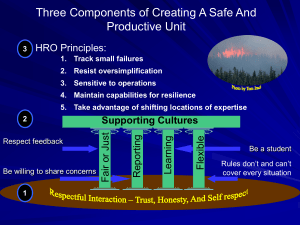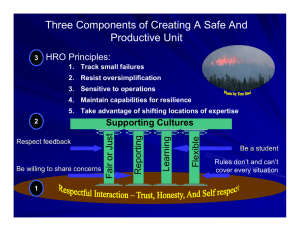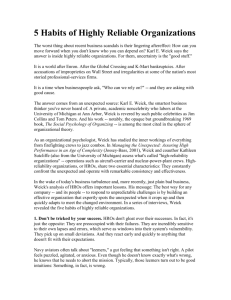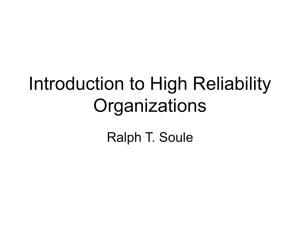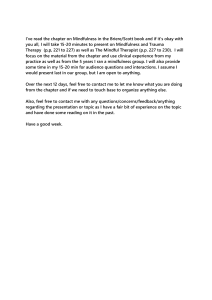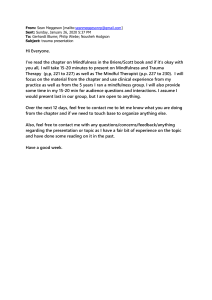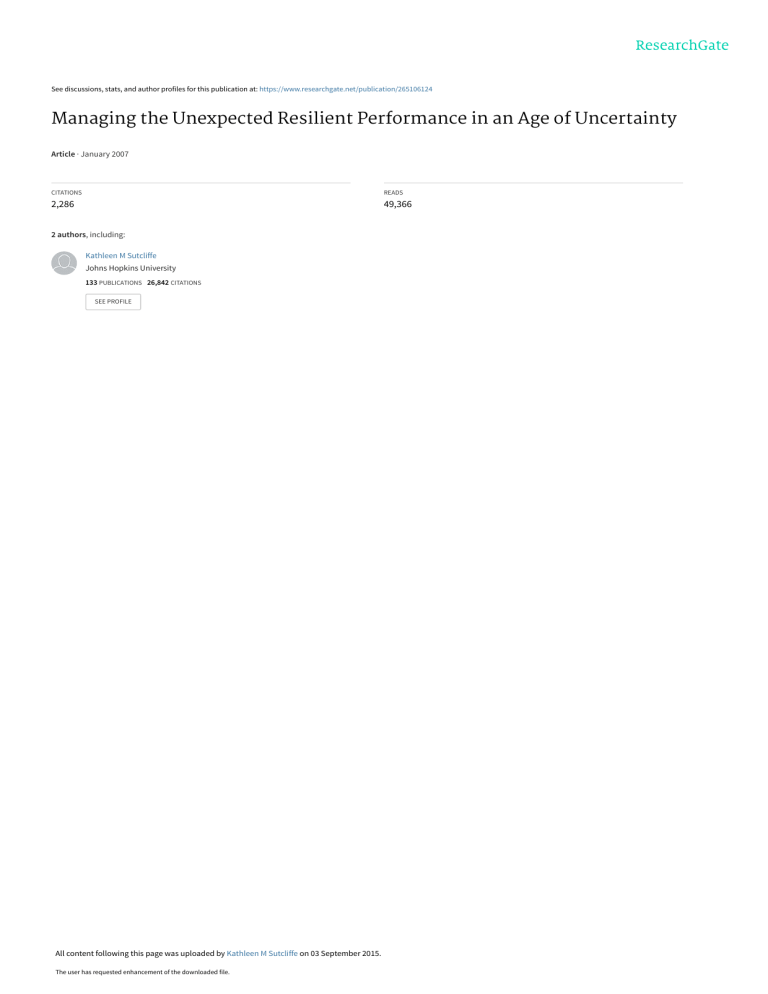
See discussions, stats, and author profiles for this publication at: https://www.researchgate.net/publication/265106124 Managing the Unexpected Resilient Performance in an Age of Uncertainty Article · January 2007 CITATIONS READS 2,286 49,366 2 authors, including: Kathleen M Sutcliffe Johns Hopkins University 133 PUBLICATIONS 26,842 CITATIONS SEE PROFILE All content following this page was uploaded by Kathleen M Sutcliffe on 03 September 2015. The user has requested enhancement of the downloaded file. Managing the Unexpected Resilient Performance in an Age of Uncertainty by Karl E. Weick and Kathleen M. Sutcliffe Jossey-Bass © 2007 208 pages Focus Leadership & Management Strategy Sales & Marketing Finance Take-Aways • You can’t plan for everything. Something unexpected will always happen, from hurricanes to product errors. • Planning can actually get in the way of useful responses, because people see the world through the lens of their plans and interpret events to fit their expectations. Human Resources IT, Production & Logistics Career Development Small Business Economics & Politics Industries Intercultural Management Concepts & Trends • The more volatile your work environment, the more important it is to respond well in the moment. • To make your organization more reliable, anticipate and track failures. Determine what they teach you. • Focus on operations, rather than strategy. • To become more resilient, emphasize learning, fast communication and adaptation. • The person making decisions about how to solve a problem should be the person who knows the most about it – not the person who’s highest in the hierarchy. • To build awareness, audit your organization’s current practices. • To make your organization more mindful, don’t oversimplify. • Real mindfulness may require changing your organizational culture. Rating (10 is best) Overall Applicability Innovation Style 7 9 7 7 To purchase abstracts, personal subscriptions or corporate solutions, visit our Web site at www.getAbstract.com, send an e-mail to info@getabstract.com, or call us in our U.S. office (1-877-778-6627) or in our Swiss office (+41-41-367-5151). getAbstract is an Internet-based knowledge rating service and publisher of book abstracts. getAbstract maintains complete editorial responsibility for all parts of this abstract. The copyrights of authors and publishers are acknowledged. All rights reserved. No part of this abstract may be reproduced or transmitted in any form or by any means, electronic, photocopying or otherwise, without prior written permission of getAbstract Ltd (Switzerland). This summary is restricted to the personal use of Andres Villalaz (andres.villalaz@forbo.com) Relevance What You Will Learn In this Abstract, you will learn: 1) Why no organization can plan for everything; 2) How “High Reliability Organizations” approach unexpected crises; and 3) How to make your organization more mindful and more resilient. Recommendation Karl E. Weick and Kathleen M. Sutcliffe give readers something new and useful in this book. Countless manuals explain how to plan for crises and make it sound like everything will go smoothly if you just plan correctly. Weick and Sutcliffe know better. Planning, they say, may even stand in the way of smooth processes and can be the cause of failure. They base this discussion on their studies of “high reliability organizations” (HROs), like fire fighting units and aircraft carrier crews, organizations where the unexpected is common, small events make a difference, failure is a strong possibility and lives are on the line. From those examples, they deduce principles for planning, preparation and action that will apply to any company facing change. The book is not perfect – the authors overuse quotations and rely on buzzwords that don’t add much – but it addresses often-neglected aspects of management. getAbstract recommends it to anyone who is trying to make an organization more reliable and resilient amid change. Abstract “If you want to manage the unexpected, you have to understand, first, how…expectations work and, second, how to engage them mindfully.” Learning from High Reliability Organizations Things you don’t expect to occur actually happen to you every day. Most surprises are minor, like a staff conflict, but some aren’t, like a blizzard. Some test your organization to the verge of destruction. You can’t plan for the unexpected, and in many cases, planning actually sets you up to respond incorrectly. You make assumptions about how the world is and what’s likely to happen. Unfortunately, many people try to make their worldview match their expectations, and thus ignore or distort signs that something different is happening. People look for confirmation that they’re correct, not that they’re wrong. Planning focuses organizational action on specific, anticipated areas, which shuts down improvisation. When people plan, they also tend to “repeat patterns of activity that have worked in the past.” That works well if things stay the same – but when they change and the unexpected erupts, you are left executing solutions that don’t really fit your new situation. “If you’re like most organizations, you want to rapidly become reliable and improve your performance. But all too often there is limited time for improving.” Consider organizations such as hospital emergency departments or nuclear power plants, which have to cope with extraordinary situations on a regular basis. These organizations have learned to deal regularly with challenging, disruptive events. They have adapted so that they react appropriately to the unexpected. They recognize that planning can only take an organization so far. After that, the way it responds to crisis determines its success. Your company can learn from the way these “high reliability organizations” (HROs) respond to crises, and, more generally, you can use their organizing principles in your own organization. Five core principles guide these HROs. The first three emphasize anticipating problems; the last two emphasize containing problems after they happen: 1. HROs monitor “small failures” – If something minor goes wrong, HROs don’t just shrug it off. If you’re fighting forest fires or landing planes on aircraft carriers, you can’t Managing the Unexpected © Copyright 2009 getAbstract 2 of 5 “Unexpected events often audit our resilience. They affect how much we stretch without breaking and then how well we recover.” 2. “Mindfulness…is about the ability of a system to concentrate on what is going on here and now.” “Mindfulness conveys a mental orientation toward continually refining and differentiating categories, an ongoing willingness…to invent new categories that carve events into more meaningful sequences, and a more nuanced appreciation of context.” “There is no question that when you organize, you simplify. But you don’t need to simplify casually or habitually or instantly.” 3. 4. 5. ignore a small glitch because it could lead to serious repercussions, even death. HROs examine each small failure to see if it indicates a failure in the system. They ferret out causes to make sure that small malfunctions are not signs of larger faults. They track down the origins of current glitches to see if they might signal serious future issues. Start working on “detecting failure” by using a simple checklist to identify practices that tend to generate problems. For example, when you change supervisors, more glitches are likely in the new boss’s area. Likewise, when people try to do too much or race to meet deadlines, trouble is more likely. You’re likely to encounter problems when people don’t share the same perspective about a mutual task. Look for potential failures in three realms: the most critical areas, the most frequently completed tasks and the places where human choices most affect the system. Imagine what might go wrong and where it is likely to happen. Reward people for admitting mistakes. HROs are “reluctant to accept simplification” – Simplification is good and necessary. You need it for order and clarity, and for developing routines your organization can follow. However, if you simplify things too much or too quickly you may omit crucial data and obscure essential, information you need for problem solving. Labeling things to put them in conceptual categories can lead to dangerous oversimplification. NASA’s practice of classifying known glitches as “in-family” and new problems as “out-of-family” contributed to the Columbia disaster. By miscategorizing the damage to the shuttle as a maintenance-level “tile problem,” people downplayed its importance. To reduce such labeling danger, use hands-on observation. When things go wrong, don’t count on one observer; make sure people from varied backgrounds have time to discuss it at length. Re-examine the categories your organization uses and “differentiate them into subcategories,” so nothing gets hidden or blurred. HROs remain “sensitive to operations” – Stay focused on the actual situation as it is happening. Of course, aircraft carrier crewmembers, for instance, should align their actions with the larger strategic picture – but they can’t focus there. They must keep their focus on the airplanes that are taking off and landing on their deck. They have to pay attention to “the messy reality” of what’s actually happening. To improve your focus, refuse to elevate quantitative knowledge above qualitative and experiential knowledge. Weigh both equally. When you have “close calls,” learn the right lessons from them. Close calls don’t prove that the system is working because you didn’t crash. Close calls show that something’s wrong with the system since you almost crashed. HROs develop and maintain “a commitment to resilience” – When the pressure is off, you might be able to believe that you’ve developed a perfect system that will never have to change. HROs know better. They regularly put their systems under incredible stress and unforeseen circumstances do arise. HROs know they have to adapt continually to changing circumstances. Resilience consists of three core capabilities. Your organization is resilient if it can “absorb strain” and keep working, even when things are hard, if it can “bounce back” from crises and if it can learn from them. HRO leaders celebrate when their organizations handle crises well, because it proves their resilience. Encourage people to share what they know and what they learn from crises. Speed up communication. Emphasize reducing the impact of crises. Practice mindfulness. Keep “uncommitted resources” ready to put into action when a crisis erupts. Structure your organization so that those who know what to do in a specific situation can take the lead, rather than hewing to a set hierarchy. HROs practice “deference to expertise” – Avoid assuming that a direct relationship exists between your organization’s formal hierarchy and which person knows best Managing the Unexpected © Copyright 2009 getAbstract 3 of 5 “Part of what distinguishes high reliability organizations from other organizations is the extent to which they obsess over the question of what to ignore.” “HROs…are responsive to the messy reality inside most systems.” “The brief period after you have finished the mindfulness audits is a lot like the period right after the chaos of a battle on the battlefield. There are truths lying around everywhere that may be picked up for the asking.” “Skeptics, curmudgeons, and iconoclasts are welcome in a mindful system, even if their presence is not always pleasurable.” what to do in a crisis. Often specific individuals possess deep expertise or situational knowledge that should leapfrog the hierarchy, so put them in charge of relevant major decisions. To increase your organization’s deference to expertise, focus on what the system knows and can handle, rather than taking pride in what you or any other individual knows and does. Recognize that expertise is “not simply an issue of content knowledge.” Instead, it consists of knowledge plus “credibility, trust and attentiveness.” Recognize and share what you know, even when people don’t want to hear it – but also know your limits and hand off authority when you reach them. Auditing Your Organization for Mindfulness You can’t shut your organization down and redesign it as an HRO, so find ways to redesign it while it is functioning. Start by auditing your current practices from numerous perspectives. These audits themselves will increase mindfulness. Ask questions to get people talking. As you review past crises as learning opportunities, you’ll start developing resilience. Study how much people in your organization agree and where agreement clusters. People at HROs tend to agree across their organizations’ different levels, so you have a problem if managers and front line workers disagree. Heed the areas where people disagree most about what to do or how the organization should function. See which aspects of reliability are strengths for you. Do you anticipate problems better (good planning)? Or are you better at containing them (good responsiveness)? Determine which audit findings are upsetting and “where you could be most mindful.” Ask: • Where are you now? – Examine how mindful your firm is now. Do you actively pay attention to potential problems? Does everyone agree what is most likely to go wrong? Do you all attend to potential problem areas to make the firm more reliable? • How mindless are you? – Do you pressure people to do things the same way all the time or to work without needed information or training? Do you push people to produce without independent discretion? Such practices lead toward mindlessness. • Where do “you need to be most mindful?” – Things are likelier to go unexpectedly wrong when your processes are “tightly coupled” and “interactively complex,” as in a nuclear power plant. Look for these qualities to see where you need to be most intensely mindful. If you can work in linear units that you fully understand without feedback from one unit to the next, you need comparatively little mindfulness. But, if your processes demand coordination and cooperation, or if you’re a start-up and don’t yet have all of your systems fully in place, feedback must flow. That’s when you need mindfulness most. • Does your organization obsess over failure? – Encourage people to envision things that might go wrong and head them off. Ask yourself how consciously you seek potential failures. When something happens that you didn’t expect, does your organization figure out why? When you barely avoid a catastrophe, do you investigate why things almost went wrong, and learn from them? Do you change procedures to reflect your new understanding? On a simpler level, can people in your organization talk openly about failure? Do they report things that have gone awry? • Does your organization resist simplification? – Rather than assuming that your organization knows itself and has the correct perspective, challenge the routine. This won’t always make for the most comfortable workplace, but you must pay attention to real complexity. What do you take for granted? (Your goal is to be able to answer “nothing.”) Push people to analyze events below the surface. To deepen their understanding, people must trust and respect each other, even when they disagree. Managing the Unexpected © Copyright 2009 getAbstract 4 of 5 “By definition, errors, surprises and the unexpected are difficult to anticipate.” “HROs are… preoccupied with events that deviate from what they expected, especially deviations that foreshadow strategically significant failures.” “Churchill’s audit consisted of four questions: Why didn’t I know? Why didn’t my advisors know? Why wasn’t I told? Why didn’t I ask?” • Does your organization focus on operations? – Thinking about the big strategic picture is a lot of fun – but to be resilient, you need to monitor what is actually happening now, rather than assuming things are running smoothly. Seek feedback. Make sure people meet regularly with co-workers organization-wide, so they get a clearer overall picture. • Are you committed to becoming more resilient? – HROs show their commitment to resilience by funding training so people can develop their capacities. You want people to know as many jobs and processes as possible. Besides formal training, encourage people who meet “stretch” goals, use knowledge and solve problems. • Does your organization defer to expertise? – How much do people want to do their jobs well? Do they respect each other and defer to those who know an issue best? Building a Mindful Organizational Culture If you’re the only person in your company dedicated to mindfulness, the dominant “organizational culture” will swamp your good intentions. To make your organization more like an HRO, help it adopt an “informed culture” with these “four subcultures”: 1. A “reporting culture” – People share their accounts of what went wrong. 2. A “just culture” – The organization treats people fairly. Define “acceptable and unacceptable” action and do not punish failures that arise from acceptable behavior. When something goes wrong, seek reasons, not scapegoats. 3. A “flexible culture” – If your work is very variable, like fighting fires, don’t depend on a rigid, slow hierarchy. Foster individual discretion and variation instead of uniformity. 4. A “learning culture” – Increase everyone’s capacity; provide opportunities for people to share information. Your organization’s culture manifests at several levels. It ascends from the level of physical objects, which can symbolize a corporate personality, to linked processes and then up to the level of abstractions, like shared values and assumptions. “Artifacts are the easiest to change, assumptions the hardest.” Top managers must consistently model and communicate the changes they want. State your desired beliefs and practices, give employees feedback and reward those who succeed. As you move into implementing new activities, follow a “small wins strategy,” focusing on attainable goals. Start with the “after action review” in which people compare what they did in a crisis to what they intended to do, why it differed and how they’ll act in the future. Encourage people to share details, rather than glossing over specifics. Support those who try to be more mindful, since being mindless is so much easier. Help them by verbally reframing objectives. For example, reword current “goals in the form of mistakes that must not occur.” Define what having a “near miss” means and what constitutes “good news.” If no accident report is filed, is that good – or does it mean things are being brushed under the rug? Train people in interpersonal skills and encourage skepticism. To raise awareness of potential glitches, ask employees what unexpected occurrences they’ve seen. Meet with people face to face to get the nuances they communicate nonverbally. About the Authors Karl E. Weick wrote The Social Psychology of Organizing. He teaches at the University of Michigan’s Ross School of Business, where Kathleen M. Sutcliffe is the associate dean. Managing the Unexpected View publication stats © Copyright 2009 getAbstract 5 of 5
